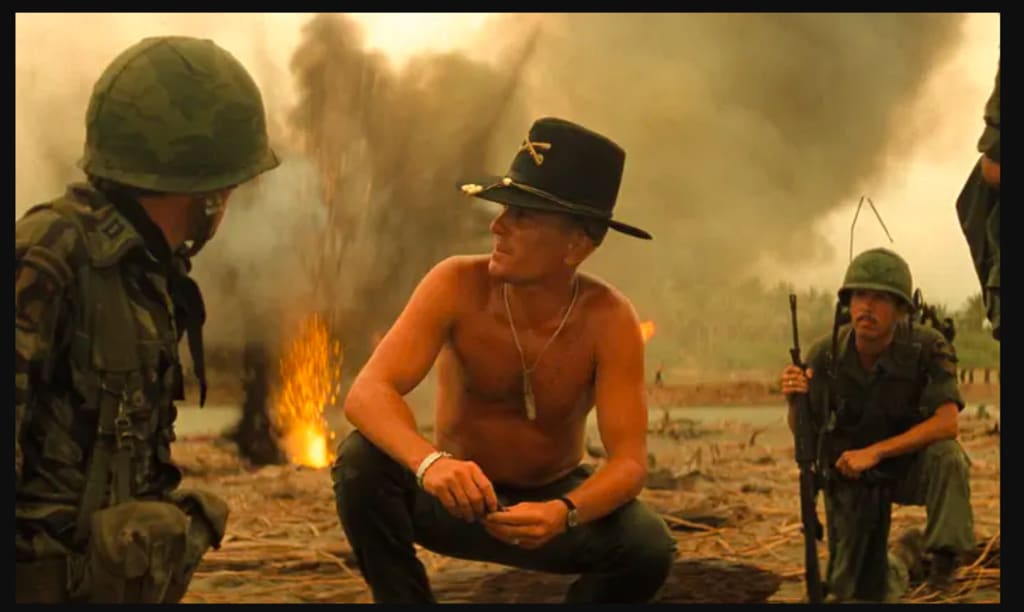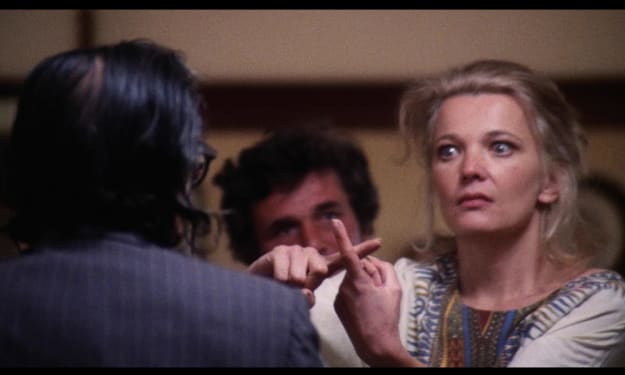Apocalypse Now (Francis Ford Coppola)
Movie Review

No matter how hard it may be to believe, the movie Apocalypse Now came about as a suggestion from two young production assistants who were helping Francis Ford Coppola make The Rain People in 1969. These two assistants kept pushing screenwriter John Milius to write a story about the Vietnam War, but he was reluctant. However, Coppola was quickly seduced by the idea and Milius had to accept under pressure. Since he lacked inspiration and had no inclination for the subject, Milius decided to rewrite and adapt a story he had read in his youth and which had impressed him greatly: Joseph Conrad's Heart of Darkness. Are two assistants responsible for instilling this desire in Coppola? Well, their names were George Lucas (25 years old) and Steven Spielberg (23 years old). Now that we know that, it's not so hard to believe anymore...
Despite all that has been said or written, Apocalypse Now is not a film about war... It is a film with war; as many military actions take place, the horrors of armed conflicts are present, as well as acts of heroism or cruelty, desperate gestures, and specific characters - all in their proper place. However, the film itself insistently speaks to us about the alienation of the human being and its possibility to migrate from reality into a dreamlike universe when the environment is no longer habitable. It is a poem interrupted by contradictory events that can have multiple meanings and unexpected associations. It is an attitude... and not far from the truth is the conclusion of the critic who said: this is not a film about Vietnam... this is Vietnam... the Vietnam of the American consciousness, of course.
Taking the subject from Heart of Darkness, i.e., the meeting of the explorer Charles Marlow with the semi-god of the indigenous populations of Central Africa, the mysterious and fascinating colonist, recluse, and madman alike, Mr. Kurtz; but also the image of the snake (the Congo River, which becomes the Nung River in the film), the theme of the journey upstream, a double and simultaneous journey, both into the depths of the jungle and into the underground of the soul, to the estuary... the ultimate goal, the abandonment of civilization, conventions, and rules... against the increasingly confused backdrop of armed conflict... John Milius recites, jerky and rhythmic, an ambiguous story loaded with symbols that exudes discreet musicality, on predominantly moving images, accompanying the confused narrative and complementing it in a felicitous manner with Cinemascope shots charged with colors shimmering in unexpected contrasts, with a strong and magical effect.
As if it were not generous enough in itself, the symbiotic infusion of Vietnam-Heart of Darkness is supplemented with significant influences from Werner Herzog's Aguirre, the Wrath of God, with remarkable technical results.
The screenplay is abyssal. Spectacular outbursts break the monotony of the journey, with inserts that seem to belong to other stories and only repeat the general idea of the plot, that of characters in an extreme situation who seem unaware of it or who have simple, direct, and ineffective existential solutions. Vietnam is a place that has swallowed immense sums during the over ten years of conflict... and for the United States, it is responsible for the loss of over 60,000 lives and the physical maiming of another 300,000 soldiers. It is a moment of collapse of humanity, as chaos and disorder temporarily, but fully, occupied that space, in all areas that had any connection to it.
In order to make a film about such social, ethical, and existential confusion, the safest and best way was to recreate the entire atmosphere on set. However, Francis Ford Coppola had other approaches in mind, but it's possible that his prayers (requesting that the new film would be groundbreaking) were answered, and God helped him in the best way He knew how: with maximum competence.
It was the craziest, wildest, and most absurd film ever made (...as if the apocalypse could happen any other way?...because it was a true Apocalypse). Coppola's bad luck, invariably poor choices, lack of inspiration, and increased irritability to unimaginable levels, along with constant arguments and temper tantrums, led everything to slide into what promised to be the most terrible disaster in cinema. Starting the filming during the monsoon season meant that the camp, which had about 900 members, remained non-functional for weeks on end. In fact, the film had spent its allocated budget (12.5 million) after the first few scenes were shot, and the peculiarities of the location (the Philippine jungle) made it impossible to organize the set where drug use, alcohol consumption, and a myriad of eccentricities had taken over the teams, making collaboration impossible.
Coppola himself was going through a critical period, bordering on madness and interspersed with frequent bouts of irrationality. It was initially triggered by the inability to secure the expected funds and continued with the outright refusal of Robert Redford, Jack Nicholson, Steve McQueen, and James Caan to play the role of Captain Willard.
When Al Pacino, the man who Coppola had raised from nothing, responded in the same hysterical manner, throwing his Oscars out the window (he would later retrieve only one of them) and threatening to quit cinema, the financial commitments already made for Apocalypse Now prevented him from withdrawing. Another supporting actor, Harvey Keitel, who was hastily cast, was fired only a few weeks later. His personality for the role of Willard was clearly beyond his abilities, so at the last minute, a virtual newcomer was brought in.
Indeed, Coppola created an apocalypse so that by examining it, he could share it with you and awaken your inner monster, so that your reason never falls asleep.
About the Creator
Andreea Sorm
Revolutionary spirit. AI contributor. Badass Engineer. Struggling millennial. Post-modern feminist.
YouTube - Chiarra AI






Comments
There are no comments for this story
Be the first to respond and start the conversation.